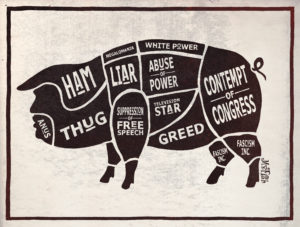‘NSA Reigns Supreme’ in Voice Recognition, Intercept Reports
Citing documents leaked by whistleblower Edward Snowden, the report raises concern about potential use of the highly refined software against civilians. Edward Snowden in 2013. (Getty Images)
Edward Snowden in 2013. (Getty Images)
Citing documents leaked by former National Security Agency (NSA) contractor Edward Snowden, a report by The Intercept on Friday reveals that the agency has used highly refined voice recognition software for more than a decade. The software was instrumental in identifying former Iraqi President Saddam Hussein, who went into hiding after the invasion of Iraq in 2003, the report says.
The technology raises concerns about the potential surveillance of American civilians. Timothy Edgar, a former White House adviser to the director of national intelligence, told The Intercept, “This creates a new intelligence capability and a new capability for abuse. … In an age of mass surveillance, this kind of capability has profound implications for all of our privacy.”
The Intercept continues:
A decade before voice commands like “Hello Siri” and “OK Google” became common household phrases, the NSA was using speaker recognition to monitor terrorists, politicians, drug lords, spies, and even agency employees.
The technology works by analyzing the physical and behavioral features that make each person’s voice distinctive, such as the pitch, shape of the mouth, and length of the larynx. An algorithm then creates a dynamic computer model of the individual’s vocal characteristics. This is what’s popularly referred to as a “voiceprint.” The entire process — capturing a few spoken words, turning those words into a voiceprint, and comparing that representation to other “voiceprints” already stored in the database — can happen almost instantaneously. Although the NSA is known to rely on finger and face prints to identify targets, voiceprints, according to a 2008 agency document, are “where NSA reigns supreme.” …
Edgar and other experts pointed to the relatively stable nature of the human voice, which is far more difficult to change or disguise than a name, address, password, phone number, or PIN. This makes it “far easier” to track people, according to Jamie Williams, an attorney with the Electronic Frontier Foundation. “As soon as you can identify someone’s voice,” she said, “you can immediately find them whenever they’re having a conversation, assuming you are recording or listening to it.”
The Snowden documents, which date from 2004 to 2012, are available to the public and reveal that NSA analysts fed some recordings through an algorithm that connected individuals to things they had said in the past, even when they spoke in code or in another language. The documents confirm that the NSA used speaker recognition in counterterrorism efforts and overseas drug busts, and suggest the NSA’s intention to use the technology against whistleblowers like Snowden.
Trevor Timm, executive director of the Freedom of the Press Foundation, noted that the technology could hypothetically be used to keep tabs on journalists, expose sources and discourage anonymous tips. “There are microphones all around us all the time. We all carry around a microphone 24 hours a day, in the form of our cellphones,” he said. “And we know that there are ways for the government to hack into phones and computers to turn those devices on.”
The Intercept reports:
A former defense intelligence official, who spoke to The Intercept on the condition of anonymity because they were not authorized to discuss classified material, believes the technology’s low profile is not an accident. “The government avoids discussing this technology because it raises serious questions they would prefer not to answer,” the official said. “This is a critical piece of what has happened to us and our rights since 9/11.” For the technology to work, the official noted, “you don’t need to do anything else but open your mouth.”
These advocates fear that without any public discussion or oversight of the government’s secret collection of our speech patterns, we may be entering a world in which more and more voices fall silent.
The latest leak from Snowden comes amid controversy over the Foreign Intelligence Surveillance Act (FISA)—passed in the House and Senate—which could expand the government’s ability to spy on digital communications without a warrant.
Snowden, who controversially acted as an NSA whistleblower, has developed an app called Haven that can detect intrusions on Android smartphones. The app is “for people who need a way to protect their personal spaces and possessions without compromising their own privacy.”
Your support matters…Independent journalism is under threat and overshadowed by heavily funded mainstream media.
You can help level the playing field. Become a member.
Your tax-deductible contribution keeps us digging beneath the headlines to give you thought-provoking, investigative reporting and analysis that unearths what's really happening- without compromise.
Give today to support our courageous, independent journalists.






You need to be a supporter to comment.
There are currently no responses to this article.
Be the first to respond.